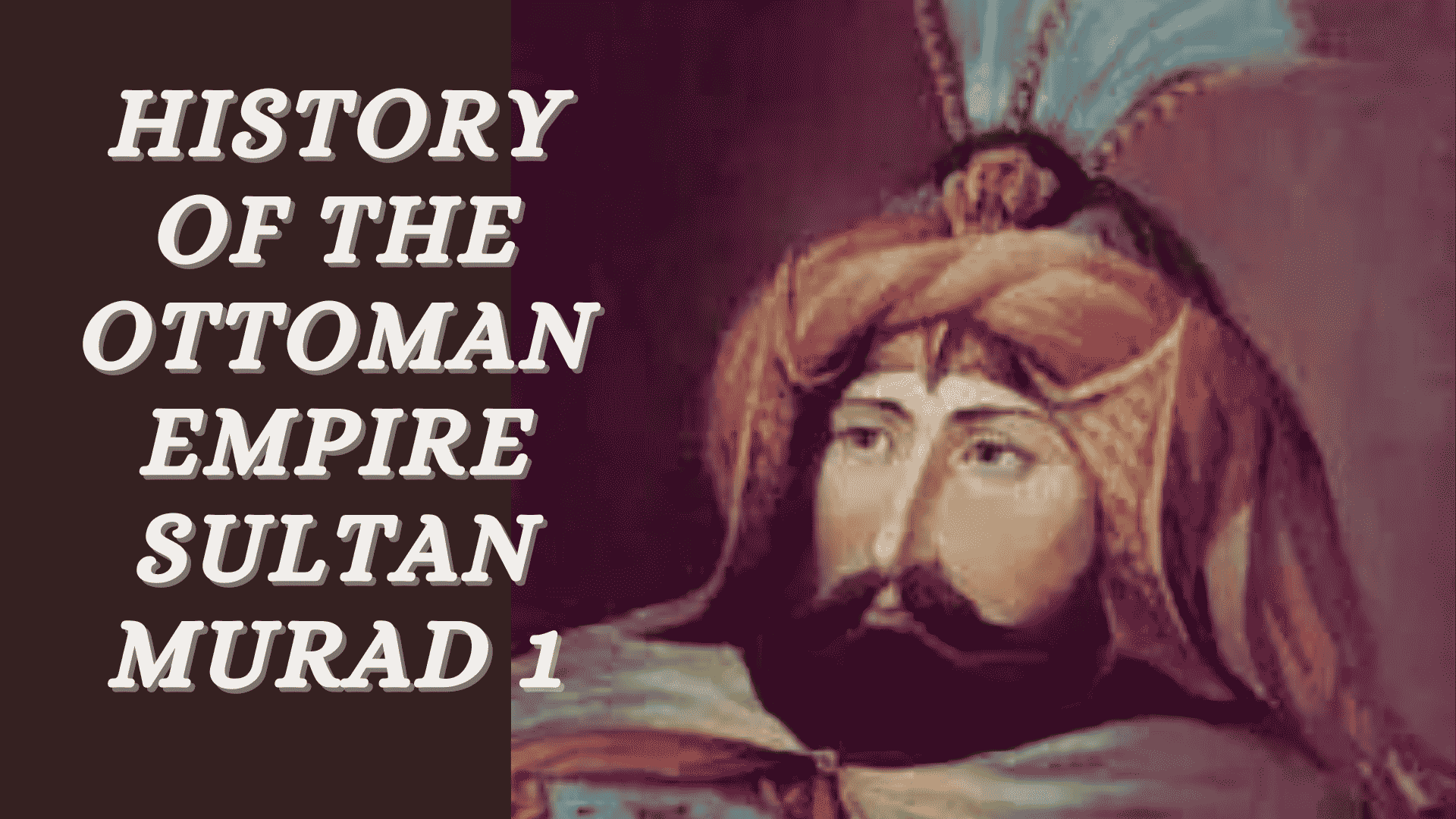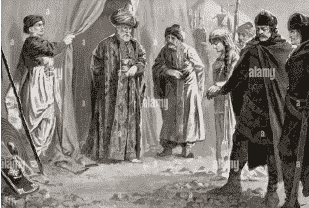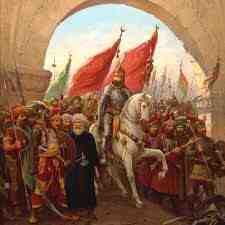Hello friends, welcome to (International Stories) in this story we will discuss History of the Ottoman Empire of Sultan Murad 1. Complete read this story maybe you will like this narrative story

History of the Ottoman Empire of Sultan Murad 1
Sultan Murad 1, also known as Murad Hüdavendigâr, was the third ruler of the Ottoman Empire and reigned from 1362 to 1389. He was born on June 29, 1326, and he was the son of Sultan Orhan and an early wife, Nilüfer Hatun.
Here is an overview of the history and key events during the reign of Sultan Murad I:
Ascension to the Throne (1362):
Murad I ascended to the Ottoman throne after his father, Sultan Orhan, passed away. He was known for his strong leadership qualities and military skills, which would serve the empire well during his reign.
Expansion of Ottoman Territories:
During his rule, Murad I focused on expanding the territorial holdings of the Ottoman Empire. He led military campaigns that extended Ottoman control into Thrace, Anatolia, and the Balkans, making significant gains in Europe. His efforts laid the foundation for further Ottoman expansion in the future.
Battle of Kosovo (1389):
One of the most significant events during Murad I’s reign was the Battle of Kosovo, fought on June 28, 1389, against an alliance of Christian Balkan states, primarily led by the Serbian Prince Lazar Hrebeljanović. The battle was intense and ended inconclusively, but it is remembered as a symbol of Serbian resistance against the Ottomans. Sultan Murad I was killed during the battle, which marked a turning point in the Ottoman-Serbian conflict.
Legacy:
Sultan Murad I is often remembered as a successful military leader who expanded the Ottoman Empire’s territorial holdings significantly. His reign was instrumental in laying the groundwork for future Ottoman rulers, particularly his son, Bayezid I, who would continue to expand the empire’s domains in Europe and Asia.
After his death, Murad I was succeeded by his son, Bayezid I, who would face various challenges, including conflict with Tamerlane (Timur), a powerful Central Asian conqueror. The reign of Bayezid I saw both the zenith and decline of the empire. Sultan Murad I’s reign, however, played a pivotal role in establishing the Ottomans as a formidable power in the region.
An Amazing Incident of Sultan Murad I
One night, Sultan Murad felt a sore knee, but he could not find out why, so he called the security in charge.
It was the custom of the king that he would disguise himself and announce the news to the people, saying,
Let’s spend some time with people.
When he reached a corner of the city, he saw a man lying down. The king shook him and saw that he was a dead man. People were passing by him.
The king called out to the people,
Come brothers,
People gathered and they could not recognize the king. Question: What’s the matter?
The king said: This man is dead. Why didn’t anyone pick it up? Who is he and where is his family?
The people said: This is a very bad and sinful person.
So Sultan Murad said: Is he not from the Ummah Muhammad i? Let’s pick him up and take him home.
The people reached the dead house.
What said her wife when they bring the dead body?
His wife started crying when she saw her husband.
People gone outside.
The king and his security are in charge of hearing the woman’s cry.
She was saying,
I bear witness, surely you are the Wali of Allah. And he is from the good people.
Sultan Murad was very surprised – how can this be? People were talking about him and were not ready to touch his dead body.
His wife said: I also expected this from people _ The real truth is that my husband went to the wine shop every day, bought as much wine as he could and brought it home and poured it into the donkey. And he said that the burden of sin is lighter than that of Muslims.
In the same way, he went to a bad woman at night and gave her one night’s wages and told her to close her door. No one will passed now.
He came to the home and said, Praise be to God! Today, I have lightened the burden of the sin of the woman and the young Muslim.
People saw him coming to these places.
One day, I said, Remember, On the day you die, people will not bathe you, pray for you, or bury you.
He smiled and said to me, “Don’t be fooled. It will be seen that my funeral will be read by the king of the time, scholars and saints.”
Hearing this, the king grew up and started saying: I am Sultan. Tomorrow we will bathe him. We will offer his funeral prayers and we will also do his burial.
Therefore, his funeral was attended by the King, Ulama, Auliya and many people.

Conclusion:
Today we sit and judge ourselves by looking at something or just hearing from others.
If we know the secrets of other people’s heart, then our tongues will become dumb.
we should not give blame others when we will not be understood.
The story you shared illustrates a powerful lesson about the importance of sincerity and true intentions in a person’s actions, as well as the potential for redemption.
Sultan Murad, the king in the story, disguised himself to mingle with his subjects and came across a deceased man whom nobody wanted to touch because he was known for sinful actions. However, when the king discovered that the man was part of the Ummah Muhammad (the Muslim community), he decided to have him treated with respect and brought to his home.
The surprising twist in the story comes when the man’s wife reveals the deceased man’s true character. While he outwardly appeared to be a sinner, he was secretly doing good deeds to ease the burdens of sin for others. He would bring wine home but pour it into a donkey, believing that this was a lesser sin than allowing Muslims to consume alcohol. He would also secretly help a woman in need.
This man’s sincerity and good deeds, hidden from the public eye, astounded both the king and the people. He had faith that his true character would be recognized when he passed away, and this faith was not misplaced. Sultan Murad and the people decided to give him a proper funeral, with the king himself participating, along with scholars and saints.
The story’s conclusion serves as a reminder that appearances can be deceiving, and the sincerity of one’s actions and intentions is what truly matters. It also highlights the potential for redemption and the power of faith and good deeds to outweigh a person’s past sins.
Overall, the story teaches a valuable lesson about not hastily judging others, showing compassion, and the belief in the possibility of redemption and forgiveness.
FAQ:
Who was Sultan Murad 1?
Murad I, an Ottoman sultan who ruled from 1360 to 1389, was born in 1326 or 1327 and died in Kosovo on June 20/28, or August 28, 1389. During Murad’s tenure, the Ottoman Empire rapidly expanded into Anatolia and the Balkans, and new systems of governance and administration emerged to strengthen Ottoman dominance in these regions.
Parents: Orhan, Nilüfer Hatun
Although Murad was assassinated by a Serbian noble who claimed to desert to the Ottoman camp, a coalition of northern Serbian lords and Bosnians halted the Ottomans at Plonik in 1387 or 1388. However, in 1389, Murad and his son Bayezid (later Bayezid I) overcame them at the first Battle of Kosovo.
How was sultan Murad 1 reign?
As his father Orhan’s successor, Murad assumed the throne. Murad’s men quickly advanced into western Thrace, conquered Adrianople and Philippopolis, and compelled John V Palaeologus, the Byzantine emperor, to become a vassal. Edirne, once known as Adrianople, was designated as Murad’s capital.

Hi Neat post There is a problem along with your website in internet explorer would test this IE still is the market chief and a good section of other folks will pass over your magnificent writing due to this problem
Your article helped me a lot, is there any more related content? Thanks!